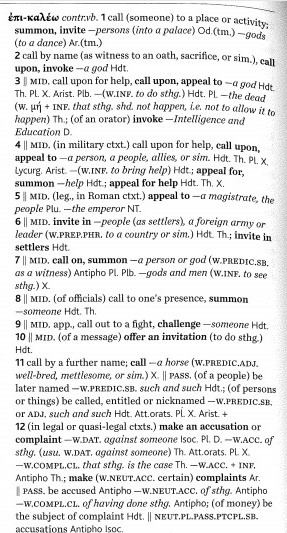I. Howard Marshall (Acts in Tyndale NT Series): The real choice, however, was left to the Lord, since apostleship is not a humanly ordained office. The assembly, therefore, prayed that he would exercise his choice in virtue of his knowledge of men’s hearts (cf. 15: 8 and especially 1 Sam. 16: 7). It is not clear whether God the Father or Jesus is addressed in the prayer, but in view of the fact that in 1: 2 the same verb is used of Jesus choosing the apostles, it is more probable that he is addressed here.
F.F. Bruce (NICNT): The prayer is couched in dignified language, with liturgical echoes.⁸⁰ The question whether the “Lord” to whom it is addressed is God the Father or the Lord Jesus is probably settled by the fact that the same verb is used in verse 24 (“thou hast chosen”) as in verse 2 (“the apostles whom he [Jesus] had chosen”).⁸¹ The same Lord who had chosen the apostles at the beginning of his ministry would choose this replacement for Judas.
D. Bock (BECNT): The choice is left to prayer and God. The prayer is simply for the choice to be made by the Lord, the one who knows the “hearts of all men” (καρδιογνῶστα πάντων, kardiognōsta pantōn). God as “the knower of hearts” appears only here and in Acts 15:8 and not at all in the LXX, but it is conceptually in 1 Sam. 16:7.[15] God is to reveal his choice (ἐξελέξω, exelexō). This verb for “select” appears twenty-two times in the NT with eleven occurrences in Luke-Acts: Luke 6:13; 9:35; 10:42; 14:7; Acts 1:2, 24; 6:5; 13:17; 15:7, 22, 25. Here is a good case where the aorist participle and the aorist verb are contemporaneous, as the praying and speaking occur together (BDF §339.1). The casting of lots will make the Lord’s choice clear. Who is the Lord referred to here? Is the Father meant or the Lord Jesus? Barrett (1994: 103) and Marshall (1980: 66) believe the latter, pointing to verse 2, where Jesus is the selector of the apostles, as well as to Luke 6:13; John 6:70; 13:18; 15:16, 19. Jesus is also addressed as Lord in Acts 1:21. The answer is less than clear. Usually, however, the Father performs the action, and Jesus mediates in Acts. In addition, the Father knows hearts in Acts 15, so the Father is probably the actor here (Conzelmann 1987: 12; parabolically, Luke 16:15; Rom. 8:27; 1 Thess. 2:4; Weiser 1981:71).
A.T. Robertson (Word Picture NT): Show us the one whom thou hast chosen
(αναδειξον ον εξελεξω). First aorist active imperative of αναδεικνυμ, to
show up, make plain. First aorist middle indicative second person
singular of εκλεγω, to pick out, choose, select. In this prayer they
assume that God has made a choice. They only wish to know his will. They
call God the
heart-searcher or heart-knower (καρδιογνωστα, vocative singular), a late word, here and Ac 15:8 only in the N.T. Modern physicians have delicate apparatus for studying the human heart.
NET Bible agrees with Bock on translating the aorist participle in Acts 1:24: see the reference in BDF. Notice that Bock departs from two of his peers, and I would like to see what Craig Keener thinks about this verse.
Eckhard J. Schnabel (ZECNT Commentary on Acts): 1:24 They prayed, “Lord, you know the hearts of all people; show us which one of these two men you have chosen” (καὶ προσευξάμενοι εἶπαν· σὺ κύριε καρδιογνῶστα πάντων ἀνάδειξον ὃν ἐξελέξω ἐκ τούτων τῶν δύο ἕνα). The assembled believers turn to God when the time has come to decide between the two candidates for the position of the twelfth apostle. Their ongoing prayers (cf. 1:14) turn to a specific decision that must be made—a decision that in this case they cannot make on their own initiative, relying on their own wisdom.
The address “Lord” (κύριε) may refer to Jesus, described in v. 2 as the one who had chosen the apostles and called “Lord Jesus” in v. 21. More likely the believers address their prayer to God, as he is called “God, who knows the human heart” (ὁ καρδιογνώστης) in 15:8, a title that reflects the Old Testament teaching about God’s knowledge of the thoughts and motivations of the individual and about his foreknowledge. The choice of who belongs to the Twelve can be made only by God, not by the assembled believers, as the original group of the twelve disciples had been made up not of volunteers but by men selected by Jesus. Thus the believers pray that God will reveal his choice.
Richard I. Pervo (Hermeneia Commentary on Acts): The prayer has formal elements that would
become standard in the liturgical “collect”: address, ascription, and petition.54 The petition is grounded
in the attribute “knowledge of human hearts.”55 Does “Lord” here refer to God, as in 15:8, or to Jesus, as in v. 2? The former appears more probable.56
[Footnote] 56 So, e.g., Conzelmann, 25; and Jervell, 128; although Barrett (1:102) argues for Jesus on
the grounds that the selection of apostles is his prerogative.


